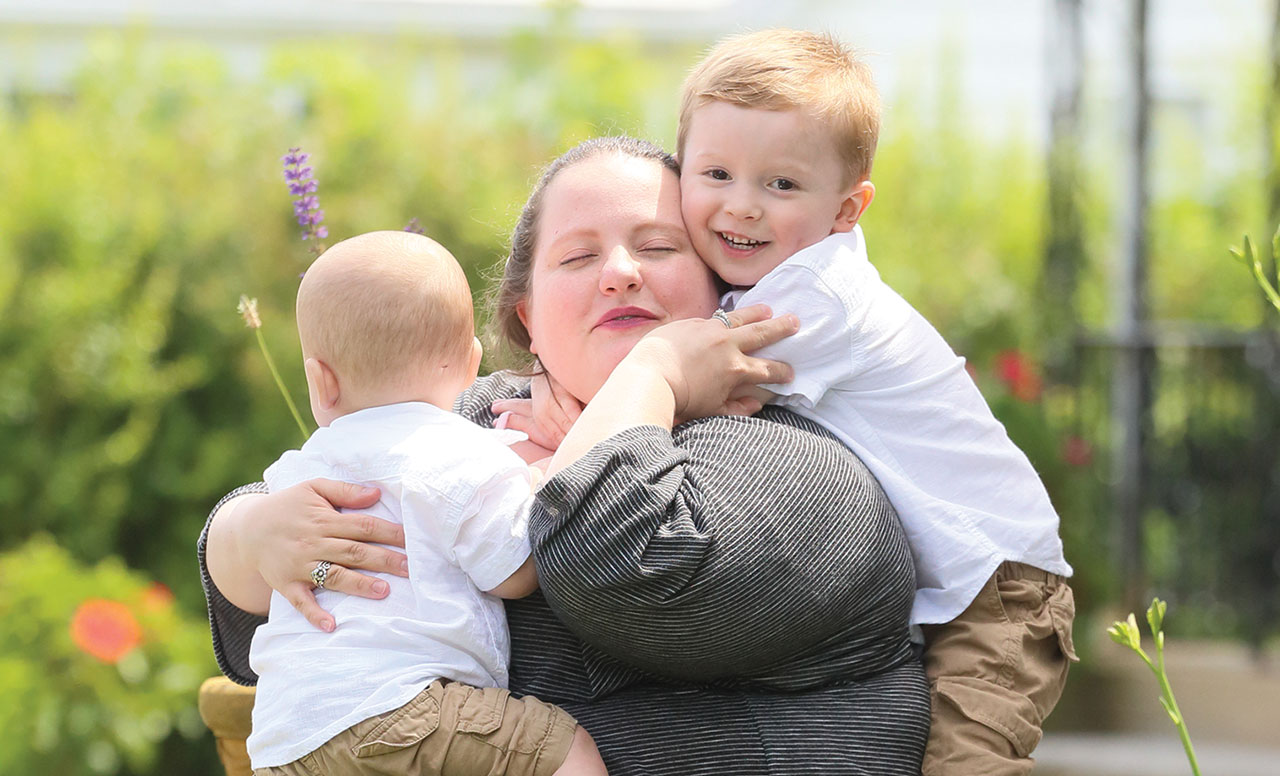Owen arrived five weeks early via emergency C-section and was rushed to the NICU, all of which was traumatic for Tammy. She had a negative reaction to the anesthesia that caused vomiting throughout the delivery. She couldn’t breastfeed her preterm baby, and she developed a bowel blockage and incision infection that necessitated readmission after her discharge. During the first two weeks after giving birth, she only saw Owen a few times.
“I felt a downward shift in my mood as soon as I returned to my room after the C-section,” recalls Tammy. “I couldn’t bond with my baby, and then I became so ill that I couldn’t even care for myself. I felt so guilty and angry. I was suffering terribly, and I didn’t tell anyone about it.”
Tammy, age 33, struggled with postpartum depression (PPD)—along with post-traumatic stress disorder (PTSD) from Owen’s birth as well as earlier trauma in her life—for 10 months before she finally broke down.
At a friend’s suggestion, she contacted the Perinatal Mood and Anxiety Disorder Center at Monmouth Medical Center, which referred her to the Women’s Program at Princeton House Behavioral Health’s outpatient Eatontown site for more intensive treatment.
Treatment Focused on Unique Needs
Patients with PPD generally need a higher level of care when symptoms do not improve with outpatient therapy or the ability to function is so impaired that a mother is unable to care for herself or her baby, according to Michelle Kerekes, LPC, LCADC, Senior Primary Therapist at Eatontown and Tammy’s therapist.
“PPD can arise unexpectedly, even following healthy pregnancies, and cause significant functional impairments,” explains Kerekes. “New moms often expect the arrival of a baby to be a joyous and exciting time. When reality does not match expectations, many women experience intense guilt and shame.”
Depending on personal history, patients with PPD may enter the trauma or the emotion regulation track at the Women’s Program at Eatontown. Offering both partial hospital and intensive outpatient options, the program provides a combination of group psychotherapy, group psychoeducation, individual therapy, and medication management, including safe medication options for women who are breastfeeding. Recognizing how much mothers are juggling, staff also provide flexibility in start dates and which days of the week therapy is attended.
“When new moms enter treatment, they frequently describe feeling controlled by their emotions,” says Kerekes. “Through education, skills training, and self-compassion work, we help them regain a sense of control and expand their window for tolerating distress.”
Incorporating DBT Skills
Patients with PPD at the Women’s Program benefit from learning dialectical behavior therapy (DBT) skills, including:
- Mindfulness—Often, mothers of infants are on autopilot without much attention to caring for themselves. Mindfulness expands insight on what they are feeling and experiencing so they can identify what skills will benefit them in the present moment.
- Emotion regulation—These skills help new moms manage mood and better care for themselves, focusing on topics like sleep deprivation, coping ahead for difficult situations, and healthy eating. A nutritionist is available on site to help with this process.
- Distress tolerance—Therapists provide strategies to widen the window of tolerance and decrease emotional intensity, so patients can respond rather than react.
- Interpersonal effectiveness—This skill module focuses on being more effective in interpersonal relationships. Family sessions with a spouse or partner also complement treatment, bringing a greater overall sense of understanding to each situation.
Kerekes also encourages patients to build a self-soothe kit filled with little objects and ideas that can bring joy each day—whether it’s a favorite piece of chocolate, essential oils, or a reminder card to take a 5-minute walk outside or to call a friend.
“Learning to practice self-care and self-compassion is critical to recovery,” adds Kerekes. “New moms can be so hard on themselves, but they are not alone and PPD is certainly not something to be ashamed of.”

Reclaiming Joy on a Personal Level
Based on Tammy’s personal history and recommendations from the team at Eatontown, she began intensive outpatient treatment in the trauma track. The program helped her work through present and past issues, and her husband, Sergio, joined her for the family therapy component. Understanding now that it’s acceptable to ask for help, she would encourage others to do the same—but sooner.
“I thought the ability to do it all defined me as a mother, but really, it’s impossible,” says Tammy. “Everyone at Princeton House was truly invested in my well-being and wanted me to succeed. I’m a happier, calmer person now.”
The benefits of therapy have extended to Tammy’s relationship with Owen, and her goal is to create the happiest life she can with her family.
“Of course I love my babies, but now I feel like I can love them more easily,” adds Tammy. “Now I get to enjoy them, too.”
Risk factors for PPD include:
|
For more information about the Women’s Program at Princeton House, visit princetonhouse.org/women or call 888.437.1610.
Article as seen in the Summer 2018 issue of Princeton House Behavioral Health Today.

